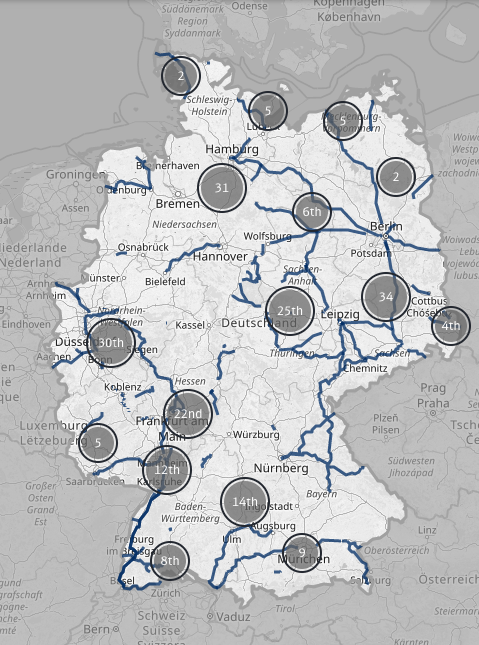‘Rail freight in Germany to a near standstill due to construction works’

The rail freight industry is deeply concerned about the disturbance on the German railway network of the last two weeks, caused by construction works.These disturbances, joined with a lack of alternative capacity being made available, has led to a situation where rail freight in and travelling through Germany on main corridors is coming to a near standstill. This was written in a joint statement by several interest groups, addressing politicians at the highest level.
The letter, dated 30 November 2021, is signed by CLECAT, ERFA, NEE, UIRR, RailGood, ESC, UIP and Essenscia, and addresses European Commissioner Adina Vălean, the German minister of Transport Scheuer, German politician Volker Wissing and Frank Sennhenn from DB Netze.

Unacceptable situation
The letter reads: “Currently, very intensive construction works are ongoing on the German rail network of DB Netz as a result of a backlog of investments. However, we expect that these works are completed in a professional and perfectly planned manner, including a high level of coordination and contingency plans addressing disturbances.
“Over the last two weeks, we faced an unacceptable situation due to disturbances on switches, signaling boxes and non-availability of personal of DB Netz. Many parts of the system – particularly along Rail Freight Corridor Rhine Alpine – have been unable to function efficiently and dozens of international freight trains had to be either parked and/or were heavily delayed. The problem-solving capability of DB Netz has been extremely weak – to the point that the performance of DB Netz has resulted in unnecessary bottlenecks.”
Damage in crucial times
According to the interest groups, these disturbances create a problem of a European dimension, because the German railway network is central to European rail freight transportation. “With six of the nine rail freight corridors transiting through Germany, the current situation therefore has the potential to cause significant reputational and economic damage to European rail freight. It worsens existing congestion problems in European seaports and their hinterlands and contributes to further supply chain shortages.”
This is especially crucial in times when rail has proven to play a leading role in keeping the supply chain running, the letter continues. “We as railway undertakings, intermodal operators, shippers, freight forwarders, wagon keepers and industry associations are working hard on ensuring freight continuity. In addition to the role of rail freight in supply chains, rail freight has to become more attractive as set out in the EU Green Deal and Sustainable and Smart Mobility Strategy and increase its market share.”
Proposals
The organisations are proposing several measures that should be taken immediately to resolve the disturbances. These are the following:
- Better coordination at international level between the various infrastructure managers for the planning of major works and construction site planning. The tendency to split construction works in smaller pieces leads to a less integrated and less international coordination;
- Equal rights for freight and passenger trains in the planning phase regarding restrictions and capacity loss. Cost-benefit analysis including the possible loss of transport capacity;
- A “freight reset procedure” should be adopted under which – using additional train paths provided during the weekends – operators of regular freight trains can remedy the delays caused during the weekday construction works and thereby catch-up to begin the new week with a clean slate;
- More intensive monitoring of construction works with the primary goal to avoid timeouts;
- Clear contingency plans (material, personnel, processes) to prepare for possible disturbances;
- Establishment of a commission which involves Railway Undertakings for the approval of works that foresee disruptions of more than 50% of the rail capacity;
- Proactive and comprehensive communication at management level in the event of serious disruptions;
- Strong commitment and priority for providing alternative capacity for international rail freight services, particularly along rail freight corridors.
A response from DB Netze is awaited.
You just read one of our premium articles free of charge
Want full access? Take advantage of our exclusive offer






Answer from DB Netze is awaited with interest…
Anybody that has seen it?
Does, may be some of current disturbances is for maintenance and for “attending maintenance”, or for repairing, thus not in words meaning “construction works”? (Construction works on railways, normally is for new lines, for new bridges etc.)